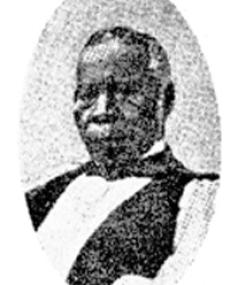
Born about 1800, in Zomba, Central Africa. From his youth the boy showed the signs of greatness and it was clear that he had a future. The country frequently suffered from raids and pretty wars. It was in 1821 that the community of Adjai”²s village had a rude awakening - slave traders had made another unwelcome visit and raided the village.
While peace reigned only a few short hours before, now everything was in confusion and the terror-stricken people were running this way and that way to avoid being captured. Men, women (with babies on their backs), boys and girls, aged and infirm, were all seeking a safe shelter. Adjai, his mother and sister were captured together with many others, and whether his father and other relatives were killed or captured they never knew.
Adjai with a group of other boys about his age were parted from their mothers and sisters and exchanged for goods, animals, and in some cases for tobacco. They change hands until a European took them over, the slaves being chained together, bundled into canoes and put aboard a Portuguese vessel, which sailed the following morning. Packed like a dogs, in an ill-ventilated place, suffering from thirst, hunger and the cruelty meted out to them, some of the slaves died in the chains. The following morning the miserable slaves, trembling with fear, were allowed to come on deck.
They were soon to rejoice in the knowledge that they were no longer in the hands slaves-traders and owners - who were now bound with ropes. They had been rescued by the British Men-of-War. Their rescuers were kind to them, and in June, 1882, they landed at Sierra Leone. Here Adjai was sent to a mission school and made wonderful progress. He was able to read and write in six months. Became a Christian and was baptised; adopted the name of Samuel Adjai Crowther. He went to England with a missionary for a few months and while there he attended school. On his return he attended classes at the Fourah Bay College, which had just been opened by the church missionary society. After the days at Fourah Bay College, Adjai became a schoolmaster, and was assisted by a classmate, Asano Susan, whom afterwards married. Adjai studied Latin and Greek. He became parish assistant. In 1841 Samuel Adjai Crowther was sent to Niger for missionary work.
Later he was recalled to England where he attended a college for training ministers, and was ordained a priest in 1842. He returned to his home where he did splendid work. A pioneer, he also undertook to translate the bible to his own language. Went from place to place visiting the people, speaking to them and teaching them. He had something to say to all, young and old. After a time he found his long-lost mother and sister who were taken away from him by the slave-traders when he was captured. It was about 25 years that they had been parted. Adjai was a Christian and they were not, but he won them over to Christianity. Opened a mission station at Abeokata and soon had a very great congregation. On his return to England by request, he was received by her Majesty Queen Victoria and her Ministers.
Later he returned with his wife to Africa, and his work. In 1857 he was leader of Christian mission, having been commissioned to accompany the third Niger Expedition up the great river. In 1864 he returned to England to report on the work done. His work had exceeded expectations. Everybody thought him a wonderful man. Large numbers of baptised Africans awaited confirmation, no bishop could be spared; Henry Venn, the church missionary secretary, proposed that Adjai be made a Bishop. When the proposal was made to him he objected, but European friends approached him and reasoned with him. At last Adjai”²s consent was won and he humbly yet reluctantly agreed.
The Queen”²s licence was issued empowering the Archbishop of Canterbury to consecrate Samuel Adjai Crowther to be a bishop of the Church of England in West Africa. The University of Oxford conferred the degree of Doctor divinity upon the Bishop-elect. Specials trains ran on St. Peter”²s Day, 29th June, 1864, between London and Canterbury. The old cathedral was full of memories. In the same cathedral bishops of many lands had been consecrated, but was the first time that an African was to be made bishop in Canterbury. Can the reader wonder that special trains were needed? The cathedral was full, and there were far more men than seats. On that day two of his friends were foremost.
The man who rescued him from slavery - Captain Sir Henry Leeke - and Mrs. Weeks, who taught him his first lessons at school in West Africa. The service was never more impressive than on the morning when Samuel Adjai Crowther was consecrated for his work. After this new bishop, the first African bishop, returned to his native land and continued his good work with greater vigour than ever. Bishop Samuel Adjai Crowther, his wife and children lived happily. He was patient, humble, persevering, loyal and progressive. He was an example of what an African could be. He educated his children, and one of his sons became Archdeacon Crowther. Bishop Crowther was able to view the fruits of his labours before he died.